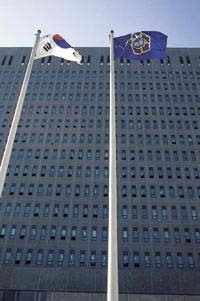 |
|
A Seoul prosecutor's office
|
Sensitive information could be leaked, civic groups say
The government is seeking to consolidate documents related to criminal cases at the National Police agency, the prosecution, courts, and the Defense Ministry into a comprehensive database to enhance operating efficiency. But the political community and civic groups are concerned about a possible compromise of private information. Though the database has been promoted by President Roh Moo-hyun, some lawmakers in the ruling Uri Party are poised to oppose the measure in the upcoming parliamentary session. In December 2004, the government formed a task force designed to spearhead the data consolidation project. The task force has completed its work at the police agency and moved to the prosecution and courts last month. The project is part of an effort to establish an "electronic government," or e-government, thereby enhancing the overall efficiency of operation and shorten the time spent in dealing with summary cases, which account for more than half of criminal cases. The government plans to complete the work by 2008. Currently, around two thirds of the project has been completed and a total of 94 billion won (US$95 million) was budgeted for it, with the LG CNS technology firm leading the consolidation plan."The project is aimed at removing overlapping work among police, prosecution, and courts while at the same time allowing people to know how their cases are being processed in an easy and convenient way," said Park Jun-mo, a ranking prosecutor in charge of the government move. But some have raised concerns that the consolidated database, which will contain sensitive personal information, could be compromised in some way. Officials at the National Intelligence Service, tax authorities, and even the Labor Ministry will have access to the envisioned database. Last year, South Korea had a total of 2,430,000 criminal cases registered, which means the personal information of those related to the cases would be vulnerable. "If the government plan goes through, sensitive information related to the investigation process, rulings, and even administrative decisions at correction facilities could be vulnerable to leaks," said Yun Hyeon-sik, a high-ranking official at the Democratic Labor Party. He also argued that there should be a line between the information to be digitalized and that which should not be. Some say that there is no specific body to control the envisioned database. And others pointed that the government move is not being pursued by legislation, but at the order of President Roh Moo-hyun. "Though it is good that the database could facilitate [a quicker] court process and stave off overlapping work, there should be an effort to specify who should be in charge of its operation, and to what extent it should be regulated," said Cho Kuk, professor at Seoul National University. Rep. Choe Kyoo-sik, lawmaker of the ruling Uri Party, joined the outcry, saying that he will take issue with the government plan in the upcoming session, expressing his displeasure over a possible emergence of "big brother" with the system’s inception.





